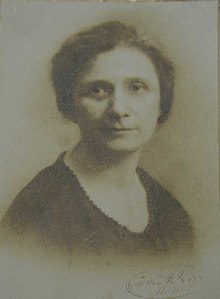Maria Bakunin
Maria Bakunin | |
|---|---|
 | |
| Born | Marija Mikhailovna Bakunina 2 February 1873 Krasnoyarsk, Russia |
| Died | 17 April 1960 (aged 87) Naples, Italy |
| Nationality | Russian-Italian |
| Alma mater | University of Naples Federico II |
| Scientific career | |
| Fields | Stereochemistry Applied chemistry Earth sciences |
| Institutions | Scuola Superiore Politecnica Accademia Pontaniana |
| Website | Official website |
Marija Mikhailovna Bakunina (also known as Marussia Bakunin) (2 February 1873, in Krasnoyarsk, Russia – 17 April 1960, in Naples), was a Russian-Italian chemist and biologist.
Education[]
Maria, even as a young student, became "preparer" at the Federico II University chemical laboratory in Naples, where in 1895 she graduated in chemistry with a degree thesis on stereochemistry.
Career[]
Following her graduation, Bakunina received the Academy prize for physics and mathematics in Naples in 1900.[1] In 1909 she went to work teaching applied chemistry at the Scuola Superiore Politecnica in Naples, where in 1912 she became Chair in Applied Technological Chemistry.[1]
Earth sciences[]
In 1906 Bakunina was part of a group studying the eruption of Mount Vesuvius, and in 1909 she compiled a geological map of Italy.[1] As part of the map project, she studied the oil shale and ichthyolithic deposits of mountains in the Salerno area of Italy. Following this, from 1911 until 1930, Bakunin worked as a consultant for local governments and companies interested in industrial development of ichthyol mines in the Giffoni district[1] (Monti Picentini).
Later career[]
After the Second World War, Bakunina worked with Benedetto Croce to rebuild the Accademia Pontaniana, and in 1944 she was elected its president.[1] In her capacity as president, Bakunina restored the Academy's library.[1]
Family[]
Maria Bakunina was the daughter of the well-known revolutionary philosopher Mikhail Bakunin and the aunt of the famous Neapolitan mathematician Renato Caccioppoli. The story is told that in 1938 Renato was imprisoned after he delivered a speech against Fascism but his aunt, Maria, was able to obtain his release by calling his mental abilities into question.
Notes[]
- ^ Jump up to: a b c d e f Ciardi, Marco; Focaccia, Miriam (2011). "Maria Bakunin (1873-1960)". In Apotheker, Jan; Sarkadi, Livia Simon (eds.). European Women in Chemistry. John Wiley & Sons. ISBN 9783527636471. Retrieved 5 Dec 2011.
References[]
- Nicolaus, Rodolfo Alessandro (2004). "Ricordo di Maria Bakunin". Atti dell'Accademia Pontaniana LII. Napoli. pp. 27–32.
- Mongillo, Pasqualina (2008). Marussia Bakunin, una donna nella storia della chimica. Rubbettino.
- English translation abstract by Manuela Baglivo
- Ciardi, Marco; Focaccia, Miriam (2011). "Maria Bakunin (1873-1960)". In Apotheker, Jan; Sarkadi, Livia Simon (eds.). European Women in Chemistry. John Wiley & Sons. ISBN 9783527636471. Retrieved 5 Dec 2011.
External links[]
- 1873 births
- 1960 deaths
- 20th-century biologists
- 20th-century chemists
- 20th-century women scientists
- Italian chemists
- Italian women chemists
- Italian biologists
- Italian women biologists
- People from Krasnoyarsk
- University of Naples Federico II alumni
- University of Naples Federico II faculty